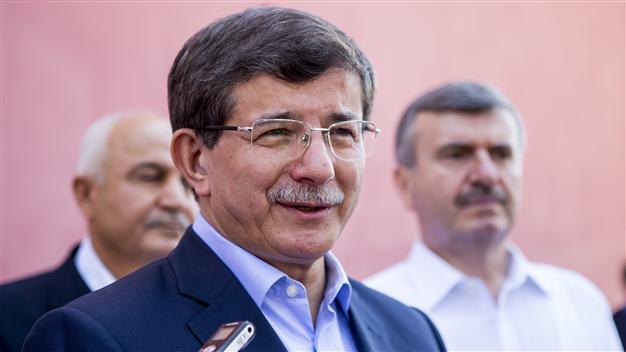Al-Maliki to blame for crisis in Iraq, FM Davutoğlu claims
ANKARA

Turkey offered its aid during Iraq’s elections for parliamentary speaker and president upon Baghdad’s request, Davutoğlu said early Aug. 11, suggesting that both of the elections were eventually carried out with ease. AA Photo
Iraqi Prime Minister Nouri al-Maliki’s insistence on not leaving office has produced the current political crisis in the country, Foreign Minister Ahmet Davutoğlu has said, adding that there was a recent coup attempt when forces reportedly surrounded President Fuad Masum’s compound.
Turkey offered its aid during Iraq’s elections for parliamentary speaker and president upon Baghdad’s request, Davutoğlu said early Aug. 11, suggesting that both of the elections were eventually carried out with ease.
“Unfortunately since an assignment is a constitutional obligation and since no conciliation could be reached among the Shiite parties concerning the prime minister, we have been passing through an intense political crisis in the last two days with al-Maliki’s insistence on the prime ministry and not giving up his position,” Davutoğlu told reporters as greeted four wounded Palestinians from the Gaza Strip at the airport in Ankara as they were flown in for medical treatment.
“With the presidential palace having been surrounded, frankly, a coup attempt was encountered. This is not an acceptable situation. Today, in Iraq, there is a functioning Parliament and a president who is resolved to use his authorities,” Davutoğlu said, voicing hope for an end to sectarian polarization in Iraq.
There were conflicting reports over whether forces surrounded Masum’s residence in Baghdad following the unrest generated around the time al-Maliki delivered a tough speech on the night of Aug. 10.
A U.S. official, speaking to Reuters news agency on Aug. 10, said he had spoken to Masum and his aides, who said reports of tanks surrounding the presidential compound were not true.
As of Aug. 11, the deputy parliamentary speaker of Iraq said a bloc comprising Iraq’s biggest Shiite parties was close to nominating a prime minister. Comments by the deputy speaker came as a direct challenge against al-Maliki who has refused to give up his bid for a third term.
Haider al-Abadi’s comments in a tweet came after police sources said special forces and Shiite militias loyal to al-Maliki had been deployed in strategic areas of Baghdad after he made a defiant speech on television suggesting he would not cave in to pressure to drop his bid for another term.
Al-Abadi is one of the people that have been mentioned as a possible successor to al-Maliki. In his tweet al-Abadi said government forces were moving around the capital in anticipation of security breaches.
Al-Maliki accused Masum of violating the Constitution by missing a deadline for him to ask the biggest political bloc to nominate a prime minister and form a government.
‘A dangerous step’In the meantime, the Foreign Ministry issued a written statement on Aug. 11 in which it described the al-Maliki’s remarks against the elected Iraqi president and deploying security forces around the presidential palace as a dangerous step.
“In this very critical process, we are calling all Iraqi leaders to give full support to President Masum, who is representing Iraq’s unity and integrity as a constitutional state,” it read.
The ministry particularly called al-Maliki to avoid a fait accompli that would further deepen the chaotic environment and to adopt approaches that would clear the way for Iraq’s stability and peace. “Our country, in this course, will continue to stand with all democratic powers in Iraq and to support the efforts for the formation of a new and inclusive government on the basis of the Iraqi Constitution,” it read.
